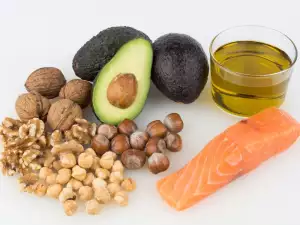In recent years, people have been beset by a veritable paranoia in regards to fat. Anyone concerned about their health tries to limit its intake to a minimum. Harmful fats do exist but not all fats should be put under a common denominator.
Generally speaking, fats are divided into saturated and unsaturated fats. Saturated fats are in solid state at room temperature and in most cases have an animal origin. The only plant products they are found in are coconut and palm oil.
Due to their high melting point, they remain in solid state in the human body, clogging arteries and raising bad cholesterol. The notoriety of fats in general is due to this same group of fats.
Unlike saturated fats, unsaturated fats are in liquid state at room temperature. They not only eliminate bad cholesterol but are vitally important for good health. The body cannot synthesize them on its own, so they need to be procured from food.
Unsaturated fats have 1 or 2 double bonds in their main carbon chain. Each of the bonds have a low level of hydrogen saturation.

Types of Unsaturated Fats
Monounsaturated fats - found in nuts and olive oil and have the ability to raise good cholesterol levels while lowering bad cholesterol at the same time.
Polyunsaturated fats - have a tendency to lower production of both good and bad cholesterol. Omega-3 and omega-6 fatty acids belong to this group, providing many health benefits.
Sources of Unsaturated Fats
Excellent sources of unsaturated fats include olives, olive oil, avocado, peanuts, rapeseed oil, hazelnuts, almonds, vegetable oils, fish. The fish richest in unsaturated fats are salmon, mackerel and trout.
Benefits of Unsaturated Fats

Unsaturated fats improve skin and hair condition, slow the aging process; are extremely important for brain development; strengthen the immune system and regulate blood sugar levels.
Unsaturated fats protect against cardiovascular diseases, cancer, stroke and diabetes, as well as allergies, inflammation and arthritis. They also play a role in sperm production, with deficiency of them capable of leading to sterility.
Eating foods containing unsaturated fats provides the body the valuable omega-3 and omega-6 fatty acids that it cannot produce on its own. These essential fatty acids aid in growth, provide a healthy skin appearance and have a crucial role in the proper function of the brain and central nervous system.
They produce substances similar to hormones that regulate blood pressure and blood clotting, while at the same time boosting the immune system.
Tips for Taking Unsaturated Fats

From a standpoint of healthy eating and the prevention of numerous serious illnesses, certain guidelines need to be followed. First of all, avoid the consumption of large amounts of salad sauces and mayonnaise, processed foods, semi-processed foods, sweet and salty biscuits.
Eat fish at least once a week, baked or sauteed. Eat fruits and vegetables as much as possible. Margarine is unhealthy, so don't overconsume it. Before reaching for it, make sure it does not contain more than 2 g of saturated fats per 1 tbsp.
When cooking, use liquid vegetable oil. Use more unsaturated fats, such as olive oil. In general, saturated fats need to be limited to a minimum, as opposed to unsaturated fats, which are healthy.
















Comments